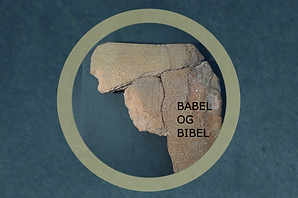
I studieåret 2025–2026 kan man ta følgende kurs: sanskrit, sumerisk, klassisk arabisk, middelalderlatin, egyptisk (hieroglyfer), israelsk hebraisk, palestinsk arabisk.
Påmeldingsfrist våren: 15. juni 2025.
(løpende opptak frem til 25. august ved ledig kapasitet)
EVENTS
See a list of upcoming events hosted by the Institute – as well as an overview of recent news.
LANDET BORTENFOR
16. november på Litteraturhuset i Oslo:
Fremføring av og samtale om verdens eldste dikt, skrevet på sumerisk ca. 2000 f. Kr. i Mesopotamia: Gilgamesh, Inanna og Reisen til Landet Bortenfor – til Dødsriket.
Les mer her –––– Last ned program
RESEARCH SEMINARS 2025–2026
Every week the Norwegian Institute of Philology (PHI) holds research seminars where we read texts in a number of ancient and classical languages. Several of these seminars are awarded ECTS credits for advanced students.
In the academic year 2025–2026 the weekly seminars include texts in Sanskrit, Tibetan, Syriac, Persian, Greek, Latin, Arabic, Egyptian, Coptic and Sumerian.
ABOUT PHI
The Norwegian Institute of Philology (PHI) is an independent research institution based in Oslo, Norway. Our research focuses on historical philology, i.e. the study of ancient and classical languages and their historical, literary and cultural environment. One of the objectives of PHI is to emphasize the need for comparative historical philology in an increasingly globalized world.
THE MULTILINGUAL HISTORICAL KORAN
In 2018 PHI launched an initiative to publish a multilingual and historical edition of the Koran – a project which investigates several aspects of this central document of Islam and of the Arabic language.
PHI organises a weekly Koran reading seminar studying the original text with early translations into Greek (870 AD), Persian (976 AD and 10th century), Turkic (11th century) and Latin (1143 and 1210).
LANDEY
The Landey project is an initiative to raise awareness about Afghan women's poetry, in Afghanistan and in Norway.
On February 8th 2018 the Embassy of Afghanistan in Oslo kindly hosted the launch of our project Language, Legacy and Landey. The project has so far organised a number of events (in Oslo, Lillehammer, London and Toronto), and there are more events and activities coming up. Follow us on Facebook and Instagram and check out our project website to stay posted!
LINGUISTIC ATLAS OF AFGHANISTAN
The Linguistic Atlas of Afghanistan (ALA) was a massive and ambitious project undertaken in Afghanistan in the 1960s and 1970s. The revival of the Linguistic Atlas of Afghanistan (2018–) is a collaborative undertaking of academic institutions in Switzerland, Afghanistan, Norway, the UK and the US. The coordinating institution is the Norwegian Institute of Philology (PHI).
I DØDE SPRÅKS SELSKAP
I døde språks selskap er en arrangements-serie om fortidens store språk og kulturer – et samarbeid mellom Norsk filologisk institutt og Universitetsbiblioteket. Les mer.
BARLAAM AND JOSAPHAT
This project studies the earliest cross-cultural transmission, from India through the Middle East to Europe, of one of the most popular literary works in medieval European literature and art: the legend of Barlaam and Josaphat – the story of an Indian pagan prince who becomes a Christian prophet.
BIBLIOTHECA POLYGLOTTA
The Bibliotheca Polyglotta (BP) is a digital corpus of major historical multilingual texts.
The BP is a rich database for linguistic and philological research, and documents the global history of concepts as displayed in a number of languages, and it demonstrates how concepts diffuse historically into new languages, and thus into new cultural contexts.

















